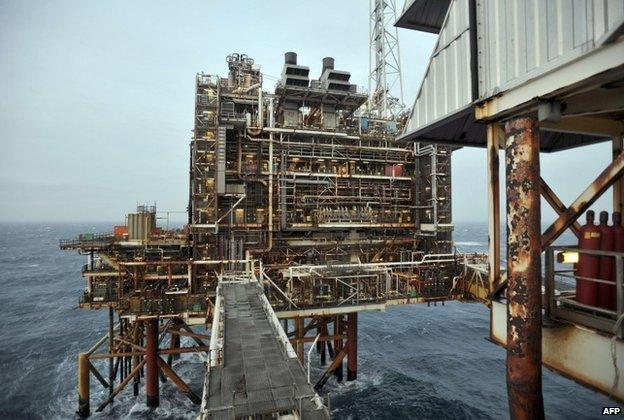Not Holyrood's finest hour
- Published
Willie Rennie made a decidedly salient point.
Oil workers in Aberdeen who were about to lose their jobs would be "appalled" by what they had witnessed at Holyrood.
The response from political leaders had, he said, been "inadequate". The exchanges had made insufficient reference to the situation in the North Sea, dealing instead with partisan points.
And Mr Rennie's own contribution?
He complained that UK government departments had been excluded from the Scottish government's task force.
Nicola Sturgeon looked baffled - then insisted that such was not the case. And so the long day wore on.
'Grumpy exchanges'
It was not, in truth, Holyrood's finest hour. The exchanges were grumpy, partisan and tangential rather than focused and precise.
There are reasons for this. Firstly, the impending UK general election has got our political leaders on edge.
Secondly, there is a devolved disjuncture at play.
Scottish Ministers are not responsible for oil taxation or indeed overall energy policy. But questions proceed with an intensity which belies that.
It started with Labour's Kezia Dugdale - but that is perhaps simply because she came first in the pecking order.
Instead of asking directly about BP and oil jobs, she opened with a question about fiscal autonomy and Alex Salmond's views thereon.

The future of the oil and gas industry has been the subject of intense political disagreement
One can understand her reasoning, in the world of politics. She was heading for the assertion that the cut in global oil prices undermined the economic case for independence.
On the day, though, it appeared to be affording secondary status to the BP announcement: real job losses, affecting real, anxious people.
So did Ms Sturgeon immediately steer the debate back to the future of the North Sea? She did not.
Admittedly, she had to deal with the question posed - but she also seized the opportunity for a partisan attack, accusing Labour of siding with the Tories in the Commons on the prospective continuation of austerity.
Ms Dugdale then briefly set off down the avenue of Scottish government underspending before listing Labour's tax plans.
Diversion upon diversion.
Finally, we alighted upon Aberdeen - although the Labour deputy leader suggested the FM had taken rather a long time to arrive in Europe's oil capital.
Scoring points
Ms Sturgeon argued that oil revenues had been squandered by Westminster, contrasting the situation with that in Norway where a huge oil fund has been accumulated.
Each leader then accused the other of petty political point scoring. They were both right.
On then to Ruth Davidson who said the SNP had inflated the potential value of North Sea oil for political ends.
Ms Sturgeon talked instead of the measures taken by her government - and urged UK ministers to introduce tax breaks to assist the industry.
Which brings us back to Mr Rennie.
I appreciate, I understand why there was such an eclectic mix of topics raised during these exchanges: old scores, future arguments rehearsed.
Not sure that oil workers in Aberdeen will feel the same.